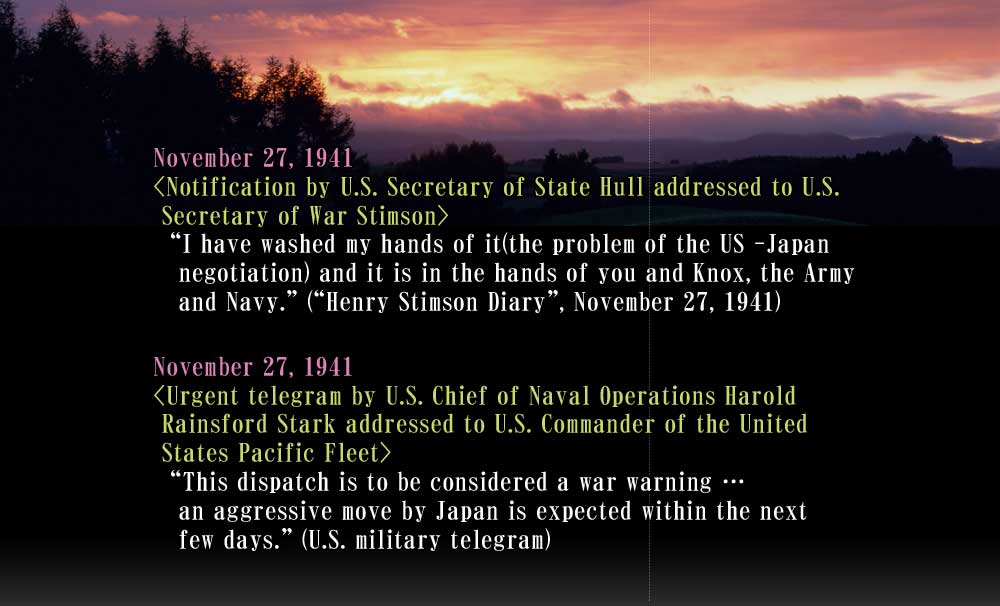Welcome to this website, named "The Sky of Dawn ― The Truth About the Pacific War, 70 Years Later
This is a website where our serious aim is to reconsider the Pacific War that began over 70 years ago.
When we use the term "Pacific War", we intend two meanings; a broad meaning, which includes the long war between Japan and China which began in 1931, and a narrow meaning which refers only to the war between the U.S. and Japan which started in December of 1941.
Regarding the latter, the war between the U.S. and Japan, we will enclose the term "Pacific War" with quotation marks. When we include the entire long war of approx. 15 years, we will write without quotation marks.
After Japan had been at war with China for more than ten years, Japan entered war with the U.S.
The war started with the well-known Attack on Pearl Harbor, the air attack on the U.S. military base in Pearl Harbor, Hawaii by the Japanese Navy Air Service on December 8th, 1941 (American date - December 7th.)
Important issues regarding the American-Japanese war starting with the Pearl Harbor attack such as:
Why did Japan enter into such a reckless war venture?
Why couldn't we stop it?
Who was responsible for this war?
Importantly, are you aware of the two clearly documented quotes, listed in the opening?
The first is a surprising message sent by U.S. Secretary of State Cordell Hull to U.S. Secretary of War Henry L. Stimson. According to the records in the "Henry Stimson's Diary" the date is November 27, 1941, ten days before the attack on Pearl Harbor.
The second, is an urgent telegram by U.S. Chief of Naval Operations Harold Rainsford Stark to the U.S. Commander of the United States Pacific Fleet, sent on the same date as the Hull message to Stimson; November 27, 1941.
It is obvious that these two messages are of prime importance to any objective scholar of the "Pacific War."
Already, by the date of November 27, 1941 - ten days before the attack on Pearl Harbor - America was informed, and had become aware that Japanese military forces would attack America within several days.
Moreover, this was not merely a prediction, but, rather, it was understood to be an inevitable situation brought about by the decision of U.S. Secretary of State Hull to have washed his hands, or be done with, any further diplomatic negotiations with Japan.
The popular and long accepted discourse with regard to the attack on Pearl Harbor was that it was an unprovoked, and sudden attack on America by the Japanese military "one sunny day" without any previous notice.
To be sure, it is a deep-rooted and generally accepted idea held by most Americans, of course, but also, by the majority of the Japanese population.
However, the two preceding quotes from two of the most important figures in the Roosevelt administration offer proof that this popularly held concept is not historically correct.
On this website, our aim is to tackle various issues broadly related to the Pacific War, centering on how and in what kind of flow and context these statements (from both sides) were given; and, finally, what led up to the attack on Pearl Harbor. Further we will include as well the ten years of conflict between Japan and China which was the premise for Pearl Harbor, and the war that followed.
Remarks
Lately, this theme was also dealt with in the American movie "Emperor" which was also shown in Japan.
It is well known that Emperor Hirohito (in Japan "Emperor Showa") had shown strong leadership in regard to the ending of the Pacific War.
Then why shouldn't have Emperor Hirohito shown this same leadership in the case of stopping the war before it began?
With the foregoing in mind, the question naturally arises, of who ultimately bears the responsibility for the war?
At the Japanese government council cabinet meeting, which was making a final decision about beginning the American/Japanese war, Emperor Hirohito recited a poem (a classic Japanese Waka poem written by the Meiji Emperor) expressing his own desire for world peace - "Surrounded on four corners by the ocean, why should our brotherhood become a turbulent ocean of war?"
While the movie depicted this famous poem scenario expressing the Emperor's desire not to go into war, his intensions in reading the poem were, more or less, left 'floating' and were unclear in the film.
In fact, more than a few Japanese have down through the years expressed sentiments such as, if I may paraphrase, 'At the conference that would determine the very fate of this nation, what the Emperor did was simply read a poem (classic Japanese Waka poem) yet he failed to exert the leadership suitable to his position…Wasn't that rather irresponsible on his part?' This kind of criticism is indeed heard against him from time to time.
However, this kind of weak image of the Emperor held by those who would accuse is a mistake, and not at all accurate. In this website I wish to shed light on the important role the Emperor played, and the quality of leadership he exerted throughout the entire war.
|





